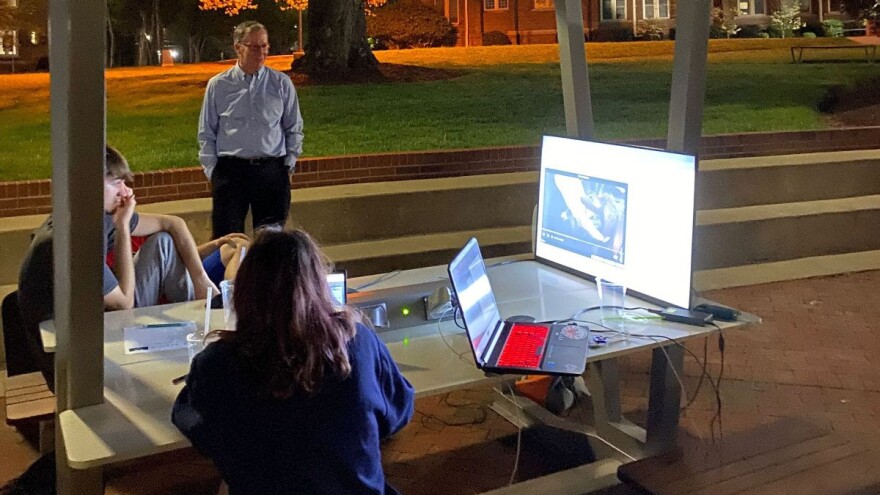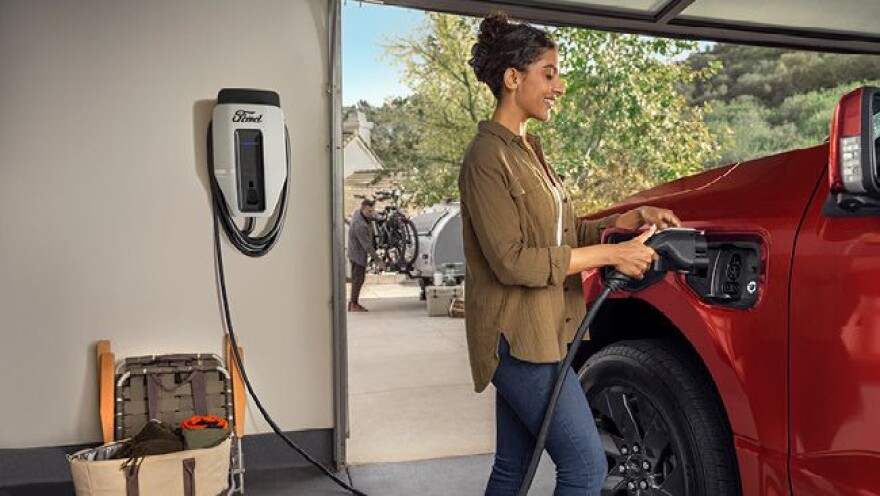Here's an innovation for device-carrying people on a college campus (which is basically everyone): a solar-and-battery-powered picnic shelter that provides both shade and power. The idea has been around for at least a decade, but as solar technology improves and prices fall, it's becoming more than just a novelty. And now it's part of the campus sustainability plan at Catawba College in Salisbury.
Last week, the college installed two Haven solar shelters made by Chapel Hill-based Spotlight Solar. Three more are on the way.
These high-tech picnic tables have wooden benches, a recycled tabletop and a gently peaked roof made of solar panels. They provide light and multiple ways to power your devices — wireless phone chargers, USB ports and 120-volt electrical outlets. Under the table are batteries that store electricity for when there's no sun, which can run for up to three days.
The first two are in front of Catawba's student union building, said Brad Ives, director of the college's Center for Environment.
"We don't have a lot of shade out here on the plaza. We lost a couple huge trees in the last few years. So it was a way to create shade," Ives said. He added: "They're always having to recharge their phones, plug in their laptops somewhere, so why not do it outside?"

It's also part of Catawba College's effort to raise the visibility of its renewable energy efforts and reach carbon neutrality, said Ives, a former solar executive and sustainability consultant. He’s also longtime friends with Craig Merrigan, Spotlight's co-founder and CEO. Think of the shelters as creating some solar buzz.
"Catawba has had a long history of solar power," Ives said this week. "You can't really tell looking around. But almost every building here that has a flat roof is covered in solar panels. We wanted to find a way to bring solar down to human scale, so that people can see Catawba's commitment to the environment."
That's the idea behind Spotlight Solar. Solar shelters are the newest product for the 13-year-old company that makes colorful solar structures — you might even call them sculptures. Spotlight markets the structures as a way for owners to show their commitment to sustainability — even if most of their energy-saving systems are hidden.

That describes Catawba College. You can’t see the solar panels covering the roofs of nine buildings. The stadium parking lot has solar panels for shade and power. And the college years ago installed an underground geothermal system to reduce energy use in heating and cooling.
The solar shelters cost "in the low $20,000s each," according to Ives. The college got funding from a private donor, and it's expecting to recoup about 40% of the cost in rebates through last year's federal climate law, the Inflation Reduction Act. That’s in part because the equipment is 100% American made, at Spotlight's factory in Sanford.
Regulators OK Duke Energy's plan to let Ford F-150 batteries feed the grid

The North Carolina Utilities Commission has approved a pilot program that would allow Duke Energy to pull electricity from customers' electric vehicle batteries when demand is high. The initial test will involve 100 customers who lease Ford F-150 Lightning electric pickup trucks. Duke plans to use data collected from the trial to help design a more widely-available commercial program in the next few years.
While the truck is plugged into a home charger, Duke would be able to reverse the flow to send electricity onto the grid. Customers who join the pilot will have their lease payments reduced by about $25 a month, or about $1,000 over a 39-month lease, in exchange for allowing Duke to draw electricity from their vehicles a couple times a month.
Customers will need Ford-supplied devices that connect the vehicle batteries to their homes — and to the grid. A Duke spokeswoman said those devices are not yet available, and it's not clear when customers might be able to enroll in the pilot. (See more in my Aug. 16, 2022, story: "Duke Energy wants to pilot using F-150 batteries to supply the grid").
Meanwhile, Duke Energy also made a flurry of other announcements this week. A couple are worthy of note:
- The City of Charlotte and Duke Energy announced a program to provide home repairs and energy-efficiency upgrades to homeowners who meet certain income limits. It's aimed at residents in the city's six Corridors of Opportunity — low-income communities targeted for investment. The program will improve homes' safety while cutting residents' electricity use and monthly bills. Duke Energy says it will spend about $4 million to help 500 income-qualified customers who are heavy users of electricity. The city will add another $1 million in American Rescue Plan Act (ARPA) funding to make any home repairs that are needed before Duke starts energy-efficiency work on the homes. The city’s work could include repairing or replacing windows, roofs, chimneys, plumbing or water heaters. Duke will work on heating, ventilation and air conditioning systems; provide energy-efficient LED bulbs; replace old appliances; and help install air sealing and insulation. Forsyth and Guilford counties are also part of the Duke pilot program. Applications are open at http://duke-energy.com/highusehelp.
- Duke says it and its partners in the Southeast Hydrogen Hub have submitted a formal application for federal funding from the U.S. Department of Energy. The U.S. Department of Energy is offering $8 billion to groups around the country to develop clean hydrogen hubs for energy, transportation or other uses. The money comes from the federal Infrastructure Investment and Jobs Act. Duke is leading a coalition that includes the Southern Company, Tennessee Valley Authority, Louisville Gas & Electric, Kentucky Utilities and the nonprofit Battelle Memorial Institute. A final funding decision is expected this fall. The Southeast Hydrogen hub was among 33 groups nationwide invited to
submit formal applications.
Calendar
April 15: Charlotte Earth Day family festival, 10 a.m. to 3 p.m. at First Ward Park, 301 E 7th St., Charlotte. This year's celebration is part of the Charlotte Shout Festival. Details: https://charlotteearthday.com/.
April 21: Embracing Health & Equity online symposium, 12:30 to 5 p.m. The virtual event hosted by Carolina Advocates for Climate Health & Equity will focus on health care's role in protecting North Carolina communities from climate change and air pollution, with a focus on practical actions for health professionals. Free continuing medical education credits. Info and registration: https://www.nccliniciansforclimate.org/2023-symposium.
April 22: International Earth Day.
April 25-26: State Energy Conference, McKimmon Center, NC State University, Raleigh — The annual conference on the business of energy offers information on technical innovation, resources and industry opportunities.







